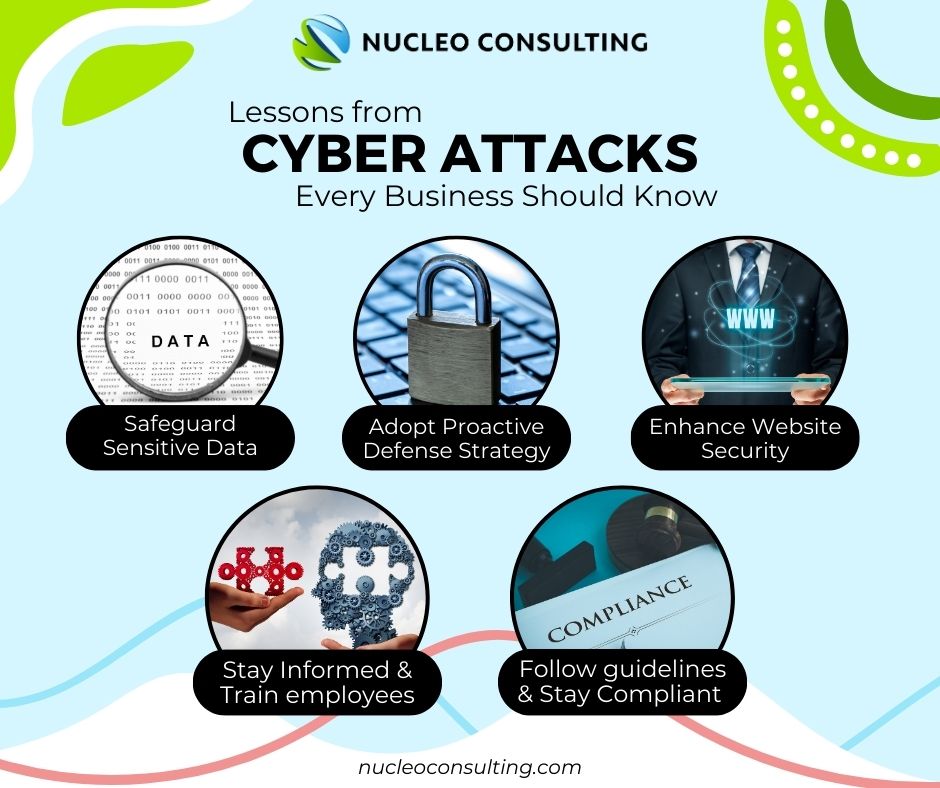Key Lessons from 5 Cyber Attacks Every Business Should Know
[2 mins read]
With today’s digital advancements, businesses face competition not only in the market but also in the challenging world of cybersecurity. Singapore, a global hub for finance and technology, has organisations among the most targeted in the world by ransomware attacks.
To help businesses strengthen their defense in this evolving landscape, the Cyber Security Agency of Singapore (CSA) has launched the CSA Internet Hygiene Portal. This free tool allows organisations to scan their email and websites for potential security vulnerabilities, promoting proactive cybersecurity practices.
We have witnessed our fair share of cyber attacks in recent years, each leaving us valuable lessons to learn from. In this article, we shed light on some of the major cyber attacks in Singapore, sharing the lessons every business should learn from, and emphasising the importance of utilising resources like the CSA Internet Hygiene Portal.

1. SingHealth Data Breach (2018): Strengthen Your Defenses
In 2018, Singapore experienced its largest data breach when hackers infiltrated SingHealth, compromising the personal information of 1.5 million patients. This incident highlighted a crucial lesson for businesses— the importance of safeguarding sensitive data. It serves as a reminder that robust cybersecurity measures are not merely an option but an absolute necessity in today’s digital landscape. Organisations must prioritise and invest in advanced security protocols to protect their data assets and maintain the trust of their clients and stakeholders.
2. Ministry of Defense (MINDEF) Internet System Hack (2017): Proactive Defense Strategy
The 2017 cyber attack on MINDEF’s internet system resulted in the personal data of 850 national servicemen and MINDEF staff stolen. This attack serves as a reminder that even governmental entities are not immune to cyber attacks. This incident highlights the importance for businesses to adopt a multi-layered cybersecurity approach.
Learning from such incidents, organisations should implement regular security audits, stay updated of the latest threat intelligence updates, and conduct comprehensive employee training programs. A proactive defense strategy, incorporating these essential components, is important in today’s evolving digital landscape.
3. Singapore Red Cross Website Defacement (2019): Uphold Online Reputation
In 2019, the Singapore Red Cross encountered a challenging situation with a website defacement attack, where hackers manipulated the organization’s website content. This incident acts as an important reminder that cyber threats are not always just about data breaches and emphasises the need to safeguard not only sensitive data but also website security.
In this digital era, businesses should recognise the potential impact of cyber attacks on their brand image and public trust, and proactively implement measures to secure their digital presence. Don’t let cyber attacks ruin the reputation you have built over the years!
4. OCBC Phishing Scam (2022): Staying Informed
In 2022, more than S$13 million was lost in phishing scams involving OCBC Bank. The bank investigated and confirmed that the victims have disclosed their online banking details and OTP on phishing websites, enabling the scammers to take over their bank accounts to make fraudulent transactions.
This incident emphasises the critical importance for businesses and individuals to stay informed about evolving cyber threats and adopt stringent measures to protect against phishing scams. Implementing robust cybersecurity protocols and ensuring regular cyber awareness training will enhance fraud detection capabilities not only for the organization but also for individuals’ defense against cyber threats.
5. Marina Bay Sands Data Leak (2023): Staying Compliant
In 2023, Marina Bay Sands reported a security breach affecting approximately 665,000 members of their shopping loyalty program. The compromised personal data includes names, email addresses, phone numbers, countries of residence, and membership numbers.
This incident highlights the importance of robust cybersecurity measures in securing customer data. Businesses must prioritise safeguarding sensitive information and ensure the protection of their clients’ details, making sure to follow and maintain compliance with PDPA guidelines or other necessary regulations.
Strengthening Your Defenses with the CSA Internet Hygiene Portal
Organisations can proactively assess and enhance their security posture by utilising the free resources available. The Cyber Security Agency of Singapore (CSA) offers the CSA Internet Hygiene Portal, a valuable tool that allows users to scan their email and website for potential security vulnerabilities. Regularly using the CSA IHP can help businesses identify and address weaknesses before they are exploited by cybercriminals.
We are proud to be recognised as an approved vendor and a Website/Email Management Provider for our strong Internet Hygiene Rating. This rating reflects our high level of adoption of internet security best practices, as assessed for Singapore-based digital platforms.
We encourage all organisations to leverage this resource to strengthen their defense. You can access the portal here: CSA Internet Hygiene Portal.
Final Thoughts: Strengthening Cyber Resilience
As the digital landscape continues to evolve, so do the tactics of the cyber attackers. The mentioned cyber attacks in Singapore offer valuable lessons for businesses and organisations worldwide. By ensuring data protection, prioritising cybersecurity, upholding online reputation, educating employees, and fostering a cybersecurity culture, businesses can build a resilient digital fortress to safeguard their digital assets and maintain the trust of their customers in an increasingly interconnected world.
Remember, cybersecurity is not a one-time investment, but an ongoing commitment to ensure a secure digital future.
IT Tips | News | Cybersecurity | Cyber Attack | Data Breach | Data Protection | Website Security | Website | Phishing | Ransomware | Scams
